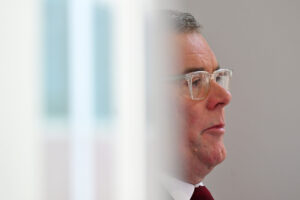Secret research undermines democracy

This month, the Australian economic debate was hijacked by a report from the world’s most powerful consulting firm: McKinsey & Co. The consulting firm apparently found that declining living standards represent a “national emergency” – and the care economy, regulations and Australia’s corporate tax rate are to blame for low productivity growth.
The only problem? The report is secret; McKinsey has only shared it with a select group. This is a well-known tactic used by consulting firms to keep their assumptions and conclusions from being scrutinised and criticised.
Not that you would know it from the uncritical reception the report has received from some politicians and journalists, particularly the Australian Financial Review which used the report to attack the government and advocate for its own policy wish list: to cut corporate taxes, encourage industrial relations ‘flexibility’ (in other words, wind back worker and union rights), and cut public spending. The report has been similarly used by the Shadow Treasurer Angus Taylor, to criticise the government.
Apparently the AFR and Taylor are among the “about 70 business leaders and policymakers” McKinsey briefed on the report. The report is unavailable on the McKinsey website and when the Australia Institute requested a copy, we were told that “[McKinsey] are not distributing this report broadly”.
In short, McKinsey is influencing public policy discourse but refusing to show the work and methodology that might justify its bold statements on Australia’s economic performance. McKinsey’s findings have essentially become ‘irrebuttable’, not because of the rigour of their methodology but because they refuse to show this methodology to any potential critics. This is highly concerning and fundamentally undemocratic; democracy thrives on the proliferation of informed and accurate information, and external review is a key mechanism for vetting the accuracy of statements and identifying any flawed assumptions.
It is reminiscent of the Robodebt scandal, where consulting firm PwC did not just keep their report secret from the public after it “confirmed, in writing, that the Scheme as it existed was a failure”, they buried it.
When it comes to economic analysis, particularly economic modelling, the rule is “garbage in, garbage out”. By keeping their methodology secret, McKinsey is asking Australians to take it on faith that they haven’t shovelled garbage into an economic model. Unfortunately, consulting firms do not have a good track record. It is one reason why the Australia Institute has proposed a Code of Conduct for Economic Modelling, to make transparent aspects of such models, including who (if anyone) commissioned the work, key assumptions, and a discussion of the choice of model.
Peter Dutton has recently demonstrated the importance of transparency and external review for democracy, through release of the Coalition’s nuclear energy plan costings. Unsurprisingly the methodology for these costings is deeply flawed and full of unrealistic assumptions, including underestimating the costs of construction, fuel and operation, and the time taken for nuclear construction, and having zero discussion of the costs of nuclear waste disposal and nuclear generation decommissioning. However, the fact that so many commentators, across various different sectors and news companies, have been able to quickly identify these flaws and publicly critique the plan is testament to the importance of transparency, it is only through public critique that voters can become fully informed on the options available to them.
Unfortunately, the use of secret reports from consultancies is not new to Australia, governments have frequently used research and advice from consultancies to justify their decisions while refusing to make this advice public. In 2014 Boston Consulting Group (BCG) conducted a review of Australia Post’s operations. At this time, the Australia Institute was able to conduct an analysis of the report and identify six specific problems with it. In 2019, BCG conducted another review, costing the Australian public $1.32 million, this time the government avoided scrutiny by refusing to release the report. Those elements that were publicly released indicated the review was again flawed, however a full public assessment of the document was not permitted, undermining accountability and informed public debate.
Secret research used to justify public claims and government decision-making undermines democracy. Transparency means claims can be robustly tested, helping ensure voters are fully informed and decisions are made on the basis of legitimate evidence. Consulting firms will always try to “have their cake and eat it too” – to influence public policy without facing public scrutiny. It is up to journalists, commentators and politicians to refuse to let them get away with it. The public deserves no less.
Between the Lines Newsletter
The biggest stories and the best analysis from the team at the Australia Institute, delivered to your inbox every fortnight.
You might also like
Failing the test: Australian universities in crisis
Great countries have great institutions, but Australian universities are a mess.
Home economics: housing, living standards and the federal election
With housing affordability at an all-time low and the spectre of Trump looming large over our region, Australians’ standard of living will be at the heart of the debate from now until election day.
Yes, Minister. The secret haggling behind the destruction of an ancient treasure.
It tells you a lot about who wields power in Australia that Woodside is being allowed to haggle in secret over the conditions of the North West Shelf expansion


